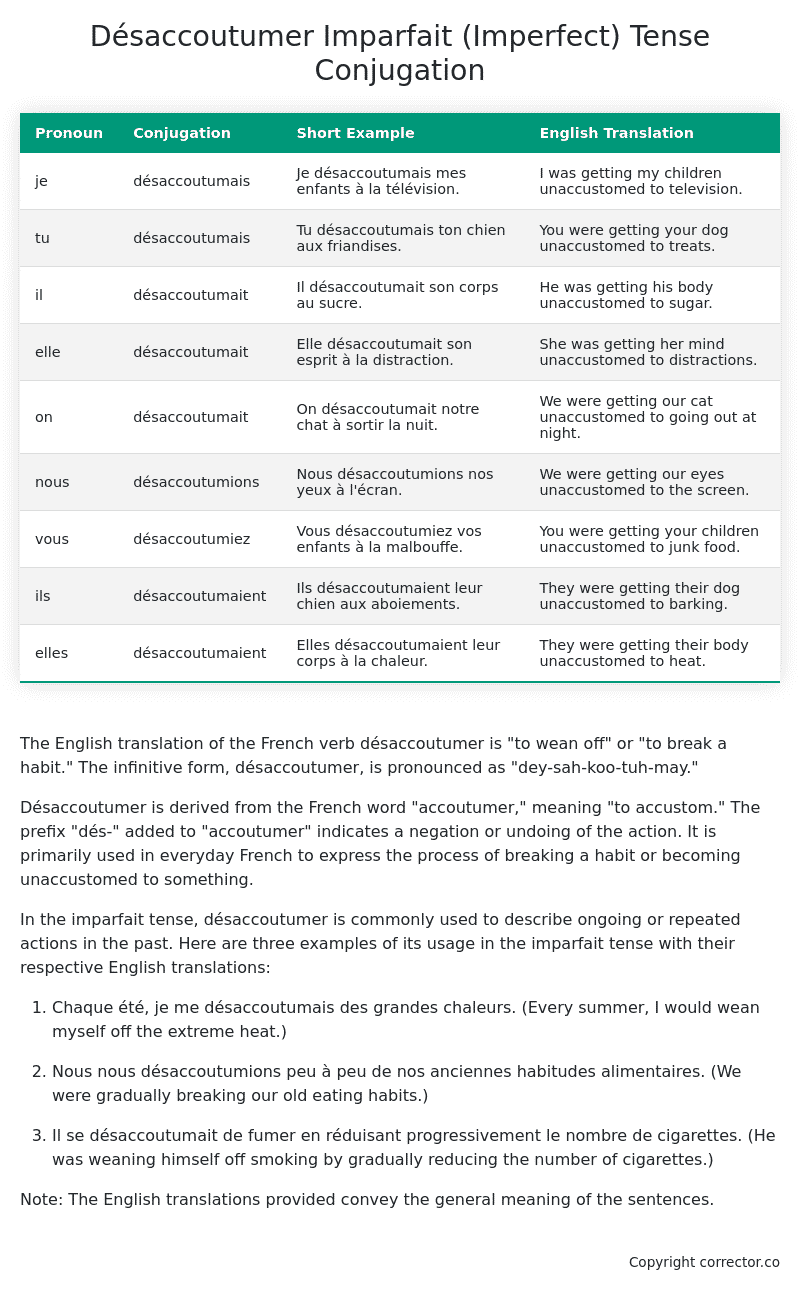Imparfait (Imperfect) Tense Conjugation of the French Verb désaccoutumer
Introduction to the verb désaccoutumer
The English translation of the French verb désaccoutumer is “to wean off” or “to break a habit.” The infinitive form, désaccoutumer, is pronounced as “dey-sah-koo-tuh-may.”
Désaccoutumer is derived from the French word “accoutumer,” meaning “to accustom.” The prefix “dés-” added to “accoutumer” indicates a negation or undoing of the action. It is primarily used in everyday French to express the process of breaking a habit or becoming unaccustomed to something.
In the imparfait tense, désaccoutumer is commonly used to describe ongoing or repeated actions in the past. Here are three examples of its usage in the imparfait tense with their respective English translations:
-
Chaque été, je me désaccoutumais des grandes chaleurs.
(Every summer, I would wean myself off the extreme heat.) -
Nous nous désaccoutumions peu à peu de nos anciennes habitudes alimentaires.
(We were gradually breaking our old eating habits.) -
Il se désaccoutumait de fumer en réduisant progressivement le nombre de cigarettes.
(He was weaning himself off smoking by gradually reducing the number of cigarettes.)
Note: The English translations provided convey the general meaning of the sentences.
Table of the Imparfait (Imperfect) Tense Conjugation of désaccoutumer
| Pronoun | Conjugation | Short Example | English Translation |
|---|---|---|---|
| je | désaccoutumais | Je désaccoutumais mes enfants à la télévision. | I was getting my children unaccustomed to television. |
| tu | désaccoutumais | Tu désaccoutumais ton chien aux friandises. | You were getting your dog unaccustomed to treats. |
| il | désaccoutumait | Il désaccoutumait son corps au sucre. | He was getting his body unaccustomed to sugar. |
| elle | désaccoutumait | Elle désaccoutumait son esprit à la distraction. | She was getting her mind unaccustomed to distractions. |
| on | désaccoutumait | On désaccoutumait notre chat à sortir la nuit. | We were getting our cat unaccustomed to going out at night. |
| nous | désaccoutumions | Nous désaccoutumions nos yeux à l’écran. | We were getting our eyes unaccustomed to the screen. |
| vous | désaccoutumiez | Vous désaccoutumiez vos enfants à la malbouffe. | You were getting your children unaccustomed to junk food. |
| ils | désaccoutumaient | Ils désaccoutumaient leur chien aux aboiements. | They were getting their dog unaccustomed to barking. |
| elles | désaccoutumaient | Elles désaccoutumaient leur corps à la chaleur. | They were getting their body unaccustomed to heat. |
Other Conjugations for Désaccoutumer.
Le Present (Present Tense) Conjugation of the French Verb désaccoutumer
Imparfait (Imperfect) Tense Conjugation of the French Verb désaccoutumer (You’re reading it right now!)
Passé Simple (Simple Past) Tense Conjugation of the French Verb désaccoutumer
Passé Composé (Present Perfect) Tense Conjugation of the French Verb désaccoutumer
Futur Simple (Simple Future) Tense Conjugation of the French Verb désaccoutumer
Futur Proche (Near Future) Tense Conjugation of the French Verb désaccoutumer
Plus-que-parfait (Pluperfect) Tense Conjugation of the French Verb désaccoutumer
Passé Antérieur (Past Anterior) Tense Conjugation of the French Verb désaccoutumer
Futur Antérieur (Future Anterior) Tense Conjugation of the French Verb désaccoutumer
Subjonctif Présent (Subjunctive Present) Tense Conjugation of the French Verb désaccoutumer
Subjonctif Passé (Subjunctive Past) Tense Conjugation of the French Verb désaccoutumer
Subjonctif Imparfait (Subjunctive Imperfect) Tense Conjugation of the French Verb désaccoutumer
Conditionnel Présent (Conditional Present) Tense Conjugation of the French Verb désaccoutumer
Conditionnel Passé (Conditional Past) Tense Conjugation of the French Verb désaccoutumer
Conditionnel Passé II (Conditional Past II) Tense Conjugation of the French Verb désaccoutumer
L’impératif Présent (Imperative Present) Tense Conjugation of the French Verb désaccoutumer
L’impératif Passé (Imperative Past) Tense Conjugation of the French Verb désaccoutumer
L’infinitif Présent (Infinitive Present) Tense Conjugation of the French Verb désaccoutumer
L’infinitif Passé (Infinitive Past) Tense Conjugation of the French Verb désaccoutumer
Le Participe Présent (Present Participle) Tense Conjugation of the French Verb désaccoutumer
Le Participe Passé (Past Participle) Tense Conjugation of the French Verb désaccoutumer
Struggling with French verbs or the language in general? Why not use our free French Grammar Checker – no registration required!
Get a FREE Download Study Sheet of this Conjugation 🔥
Simply right click the image below, click “save image” and get your free reference for the désaccoutumer imparfait tense conjugation!

Désaccoutumer – About the French Imparfait Tense
NOTE: To take a deep dive into all the French tenses then see our article on Mastering French Tense Conjugation.
Formation of the Imparfait Tense
For regular -er verbs:
For regular -ir verbs
For regular -re verbs
Common Everyday Usage Patterns
Description of Past Habits
Background Information
Mental and Emotional States
It’s employed to express emotions, thoughts, or physical sensations in the past. For example: “J’étais content quand il est arrivé.” (I was happy when he arrived.)
Ongoing Actions
Points to Note About the Imparfait Tense
Passé Composé vs. Imparfait
Conditional
Si Clauses
Narration
I hope you enjoyed this article on the verb désaccoutumer. Still in a learning mood? Check out another TOTALLY random French verb imparfait conjugation!


